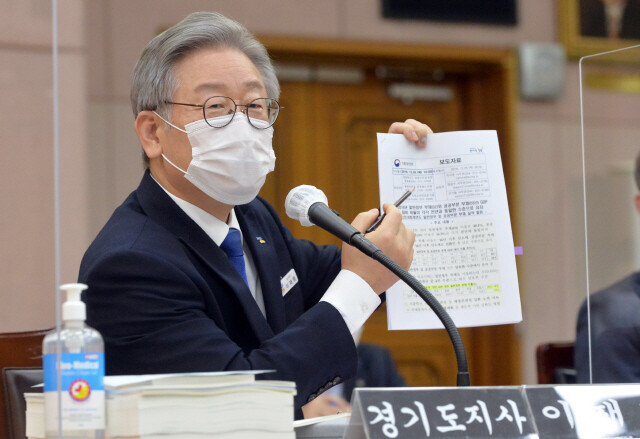
Gyeonggi Governor Lee Jae-myeong is explaining the data at the National Assembly’s National Land, Infrastructure and Transport Commission’s inspection of Gyeonggi Province held at Gyeonggi-do Office in Paldal-gu, Suwon-si, Gyeonggi-do last October. Photo Joint Report
Gyeonggi Gyeonggi Governor Lee Jae-myeong’s solo system became clear in the polls on the preference of the next political leader. The gap in preference between Prosecutor General Yoon Seok-yeol and Democratic Party leader Lee Nak-yeon widened to double digits. On the 12th to 14th, Gallup Korea asked 1,000 adults across the country to “who thinks the next president is good” (confidence level of 95%, sample error ±3.1% points), and the Governor said on the 15th that the Governor was the highest at 23%. Following this, Prosecutor General Yoon Seok-yeol showed a preference of 13%, and Democratic Party leader Lee Nak-yeon showed a preference of 10%. Ahn Cheol-soo, an independent member of the National Assembly Party and Hong Joon-pyo, were in the order of 3%, and Yoo Seung-min, a former member of the People’s Power, 1%. Compared to the survey a month ago, Governor Lee and Congressman Hong’s preferences rose 3 percentage points and 2 percentage points, respectively, and Lee’s declined 6 percentage points. Although it is within the margin of error, this is the first time that Lee has fallen behind President Yoon based on the Gallup Korea survey. Gallup Korea said, “Until July of last year, Lee’s preference was at the forefront, in the mid-20% range, but in August, the Governor Lee rose sharply, forming a competitive composition for leading passport figures. In the last month, Governor Lee rose again and CEO Lee “As the company plunged, the bilateral gap widened.”

Gallup Korea website Galmuri ※ Click the image to enlarge.
In this survey, Gallup Korea also asked for government support for President Moon Jae-in. As a result, the positive evaluation recorded 38% and negative evaluation 53%. The presidential state map Week 2 of December last year, Last week’s surveyAfter taking office this week, it recorded the lowest level. The fraud rate is down 2 percentage points from last week. In a survey of party approval ratings, the ruling Democratic Party, the ruling party, was 34% and the people’s strength was 23%. The Democratic Party fell 1 percentage point from last week, and the people’s power rose 1 percentage point. In addition, the Justice Party and the People’s Party were 5%, and the shamans were 29%. Divided by the level of political interest, the high-interest (respondents who say’there is a lot of interest in politics’) have similar support for the Democratic Party and the people’s strength, but the terms and conditions (respondents who say’there is a little interest’) and low-interest Respondents who say’there is not much interest’) showed that the Democratic Party outperformed the people by more than 10 percentage points. Gallup Korea also surveyed’what opinions they agree with regarding the 2022 presidential election’, and 39% of respondents said’the ruling party candidate must be elected to maintain the current regime’, and’the opposition party candidate must be elected for the regime change. 47% of respondents said they should. In the past two months, the new regime maintenance theory declined and the regime change theory increased, and the shamans without a supporting party wanted a replacement (54%) rather than maintaining the regime (19%), Gallup Korea explained. In the middle class, 38% of governments were maintained and 56% of them were changed. In November of last year, maintenance of the regime (46% of maintenance and 44% of replacement) was dominant, but from last month (36% of maintenance and 52% of replacement), public opinion is leaning toward the theory of regime change. For detailed survey summary and results, refer to the website of the Gallup Korea and Central Election Polls Review Committee. By Kim Mina, staff reporter [email protected]
